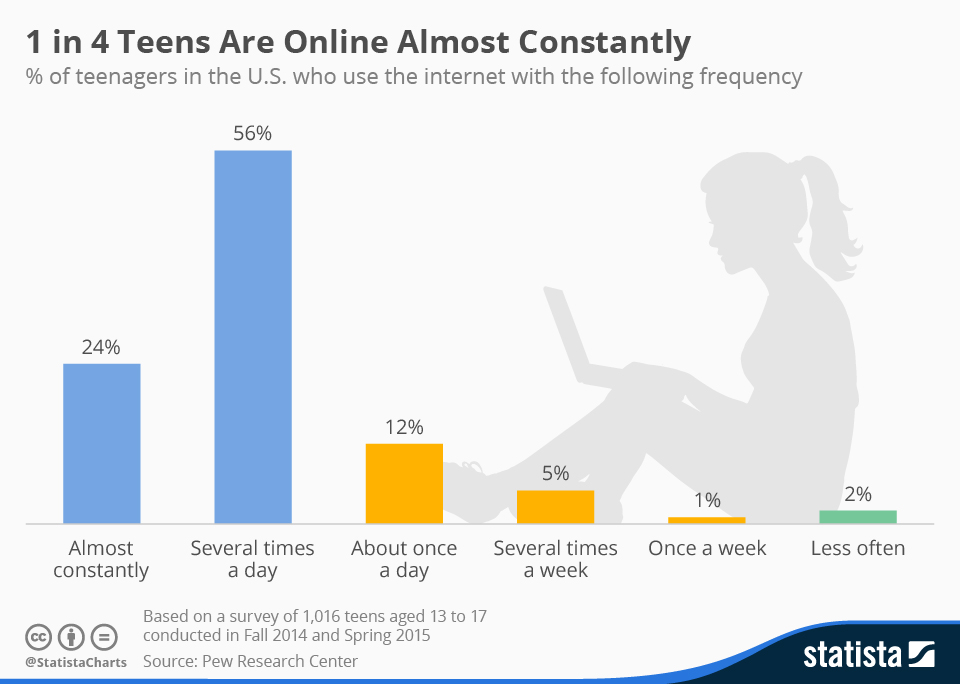Would you trust Internet health information for your teen? A study in 2016, found that 70% of youth use the internet as their first source of health information (Sansom-Daly et al., 2016). This is problematic because during this phase of pre-adulting, many teens have limited e-health literacy, lacking the knowledge and skills to filter and distinguish reliable from unreliable health information on the internet (Freeman, et al. 2018; Jain & Bickham, 2014). Locating health topics on the internet is challenging because searches return large, robust amounts of information, making it difficult to recognize whether information is reputable.

In a 2018 study, youth reported “difficulty in determining the quality of information,” indicating that they were unsure of “the trueness and correctness of the information,” “validity and reliability of the information,” and “understandability of the information” (Esmaeilzadeh, Shahrzadi, & Mostafavi, 2018, p. 9). Consequently, they may obtain poor quality or even misinformation about health for themselves, their family members, or friends.
To address these issues, a new study funded by the National Network of Libraries of Medicine (NNLM) called WebLitLegit aims to develop an interactive, teen-driven program to improve the health literacy of teens empowering them to ascertain credible health information on the Internet. Created with teens, WebLitLegit is innovative as it can be delivered in a wide range of teen settings and by a range of diverse educators such as school librarians, public librarians, secondary school teachers (health, science, etc.), school nurses, museum educators, and community volunteers. WebLitLegit aims, goals and objectives align with the NNLM mission to improve the public’s access to health information and to make informed decisions about health.
There are several reliable online information resources currently available for teens to address their health. WebLitLegit exposes teens to these reliable sources of online health information while improving their health literacy about topics they identified as important (Ghaddar, Valerio, Garcia, & Hansen, 2012). Credible online teen health information resources include but are not limited to the following list:
General teen health
Teen sexual health
Healthy and unhealthy relationships
Mental health
Violence
Medline Plus suggests considering using the internet to find health information like going on a treasure hunt. Your teen could find some real gems but could also end up in some strange and dangerous places! So how can they tell if a website is reliable?
There are five quick steps to check out a website. Let’s consider the clues to look for when checking out websites.
Launching in October for Health Literacy Month, WebLitLegit can be implemented in venues where teens typically go to learn and socialize including local libraries, museums, and schools. In addition to being shown and demonstrating known, reliable online health resources, teens will have the opportunity during the WebLitLegit workshop to independently locate new websites.

Educators adopting the workshop will empower teens with functional e-health literacy to locate information, critical e-health literacy to critically appraise the quality of health information, and interactive e-health literacy to apply the health information and make informed decisions about health (Jain & Bickham, 2014; Nordheim, Gundersen, Espehaug, Guttersrud, & Flottorp, 2016).
Contact us to learn more about the WebLitLegit study. Also, join our #WordsToLose campaign to spread the word about Health Literacy Month. Learn more here.
References
Esmaeilzadeh S, Ashrafi-rizi H, Shahrzadi L, Mostafavi F (2018). A survey on adolescent health information seeking behavior related to high-risk behaviors in a selected educational district in Isfahan. PLOS ONE, 13(11): e0206647.
https://doi.org/10.1371/journal.pone.0206647
Freeman, J.L., Caldwell, P.H., Med, B., Bennett, P.A.,& Scott, K.M. (2018). How adolescents search for and appraise online health information: A systematic review. Journal of Pediatrics, 195, 244-255.
Ghaddar, S. F., Valerio, M. A., Garcia, C. M., & Hansen, L. J. J. o. s. h. (2012). Adolescent health literacy: the importance of credible sources for online health information. Journal of School Health, 82(1), 28-36.
Jain, A.V., & Bickham, D. (2014). Adolescent health literacy and the internet: Challenges and
opportunities. Current Opinion in Pediatrics, 26, 435-439.
Nordheim, L.V., Gundersen, M.W., Espehaug, B., Guttersrud, Ø., Flottorp, S. (2016) Effects of school-based educational interventions for enhancing adolescent’s abilities in critical appraisal of health claims: A systematic review. PLOS ONE,11(8): e0161485. doi:10.1371/journal.pone.0161485
Sansom-Daly, U.M., Lin, M., Robertson, E.G., Wakefield, C.E., McGill, B.C., Girgies, A., Cohn, R.J. (2016). Health literacy in adolescents and young adults: an updated review. Journal of Adolescent and Young Adult Oncology, 5(2), 106-118. Doi: 10.1089/jayao.2015.0059